Long-term rehabilitation for earthquake survivors in north-west Syria
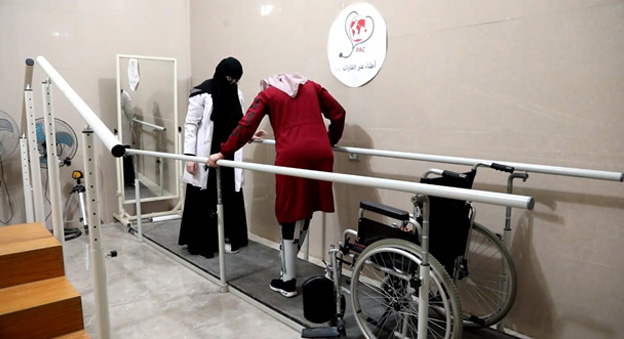 Yusra engages in physical therapy sessions at the rehabilitation centre to regain her mobility. Photo credit: Physicians Across Continents29 April 2024 – “I felt the ground shaking heavily, I ran to wake up my parents and my grandfather, then I went to wear clothes to run outside,” recounts Yusra*, a 23-year-old university student from Idlib governorate, north-west Syria. “That is all I can remember. My life had changed forever.”
Yusra engages in physical therapy sessions at the rehabilitation centre to regain her mobility. Photo credit: Physicians Across Continents29 April 2024 – “I felt the ground shaking heavily, I ran to wake up my parents and my grandfather, then I went to wear clothes to run outside,” recounts Yusra*, a 23-year-old university student from Idlib governorate, north-west Syria. “That is all I can remember. My life had changed forever.”
Yusra’s house collapsed on her as she was rushing to take cover during the series of deadly earthquakes that struck Syria and Türkiye in February 2023. Yusra was trapped beneath the rubble for many hours.
In Syria alone, the disaster caused nearly 5900 deaths and left more than 12 800 people injured. It uprooted hundreds of thousands of families, and severely damaged infrastructure already made weak by the conflict.
Most injuries sustained in the earthquake were those requiring specialized interventions and long-term rehabilitation. For example, spinal cord injuries, traumatic brain injuries, and orthopaedic conditions like fractures or crushed limbs, some of which called for amputations or other specialized orthopaedic care.
Yusra suffered from hemiplegia – a spinal cord injury that leads to paralysis on one side of the body – resulting in loss of movement in her right leg.
The psychological toll of the harrowing experience of both the earthquake and her physical injury was so profound that Yusra resisted treatment for many months.
Finally, her family convinced her to visit Step of Hope in Azaz, a subdistrict of Idlib. This WHO-supported rehabilitation centre is operated by Physicians Across Continents, a national nongovernmental organization, with generous funding from the Central Emergency Response Fund.
Individualized treatment and rehabilitation
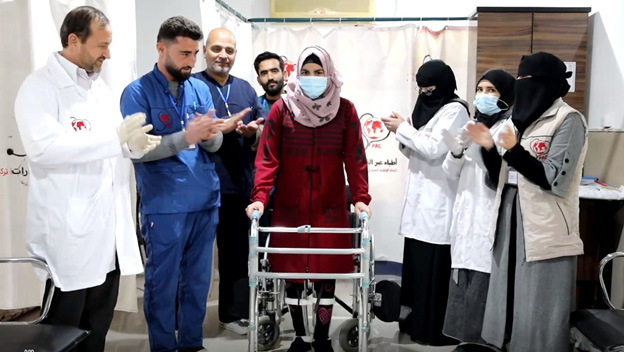 A triumphant moment for Yusra, and the entire medical team at the Step of Hope rehabilitation centre, as she takes her first steps following physical therapy. Photo credit: Physicians Across ContinentsReluctant to engage in treatment at first, Yusra gradually began to open up to the possibility of recovery thanks to the consistent support and encouragement of the Step of Hope staff.
A triumphant moment for Yusra, and the entire medical team at the Step of Hope rehabilitation centre, as she takes her first steps following physical therapy. Photo credit: Physicians Across ContinentsReluctant to engage in treatment at first, Yusra gradually began to open up to the possibility of recovery thanks to the consistent support and encouragement of the Step of Hope staff.
A tailored treatment plan for Yusra was drawn up to address both the physical and psychological aspects of her condition. Physical therapy sessions focused on improving mobility and functions. Occupational therapy aimed to restore independence in daily activities. She also received psychological support to overcome her trauma and rebuild her mental resilience.
The collaborative efforts of the centre’s health workers, including therapists, counsellors and support staff, played a pivotal role in her rehabilitation journey. Over time, Yusra made remarkable progress. She regained her mobility with the help of a walker, and her outlook became increasingly positive – so much so that she resumed her education.
“When I started the treatment, I was sceptical and afraid I would not be able to make any progress. I cannot describe my happiness being able to stand up and move my legs,” says Yusra. “Now I am determined to pursue my dreams, complete my education and become a teacher.”
In the aftermath of the earthquake, WHO supported 5 rehabilitation centres to provide similar inpatient rehabilitation services, reaching more than 23 000 people in north-west Syria.
*Name has been changed to protect privacy and security.
Big Catch-Up: WHO and partners support immunization campaign in Syria
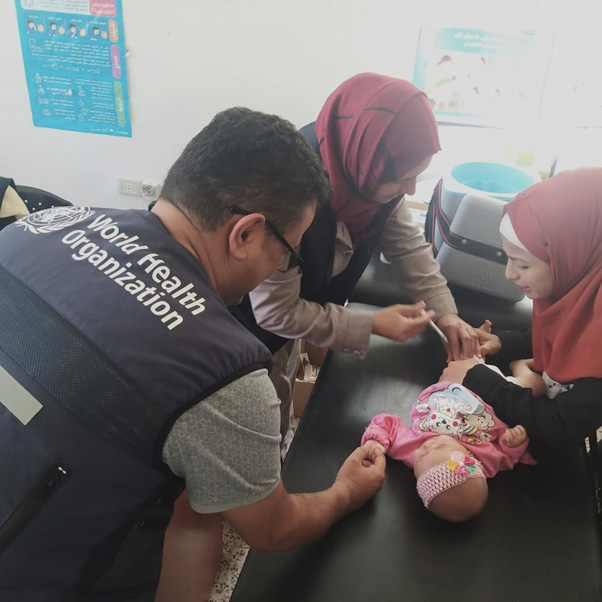 Immunization activity in rural Damascus, Syria, 2024. Photo credit: WHO Syria23 April 2024, Damascus, Syria – Syria’s first round of its Big Catch-Up vaccination activity began this week. The 10-day initiative was launched by the Syrian Ministry of Health in partnership with WHO and the United Nations Children’s Fund (UNICEF). Two further rounds of vaccination activity under the campaign are scheduled for July and October 2024.
Immunization activity in rural Damascus, Syria, 2024. Photo credit: WHO Syria23 April 2024, Damascus, Syria – Syria’s first round of its Big Catch-Up vaccination activity began this week. The 10-day initiative was launched by the Syrian Ministry of Health in partnership with WHO and the United Nations Children’s Fund (UNICEF). Two further rounds of vaccination activity under the campaign are scheduled for July and October 2024.
WHO is providing technical support to the Ministry of Health and covering the operational costs of the Big Catch-Up campaign. This has been made possible by generous contributions from Gavi, the Vaccine Alliance, and the United States Agency for International Development’s Bureau for Humanitarian Assistance.
The first round of activity will involve screening more than 2 million children aged under 5 years across Syria. These children were missed during previous campaigns owing to factors including access and population movements. All the screened children will receive the bivalent oral polio vaccine (bOPV), regardless of their vaccination history.
To achieve this, 7393 health workers from the Ministry of Health – including 4541 vaccinators at fixed sites and 1097 mobile medical teams – will be deployed to 993 health facilities and 70 temporary vaccination posts. To monitor the vaccination activity, 365 supervisors at different levels will check on progress during its implementation.
Further, 1769 communications officers will join the effort, to ensure proactive risk communication and community engagement – crucial to promote vaccination of children. To further encourage vaccine uptake, 1755 mosques and 209 churches will share key messages with communities.
Dr Iman Shankiti, acting WHO Representative to Syria, emphasized the importance of vaccination as a crucial public health strategy. “Vaccination saves millions of lives globally and is among the most cost-effective health interventions available,” she said. “WHO remains dedicated to its mission of ensuring that all children in Syria are protected from vaccine-preventable life-threatening diseases.”
The first round of the Big Catch-Up initiative overlaps with World Immunization Week, which takes place every April. This annual campaign aims to promote the use of vaccines to protect people of all ages against disease. This year’s theme is “Humanly Possible: Saving lives through immunization”.
In 2024, WHO and partners also mark 50 years of the Expanded Programme on Immunization (EPI). This anniversary highlights the great progress being made to catch up on essential immunization and get back on track to ensure that more people are protected from preventable diseases.
WHO marks 13 years of the Syrian crisis with renewed commitment and support
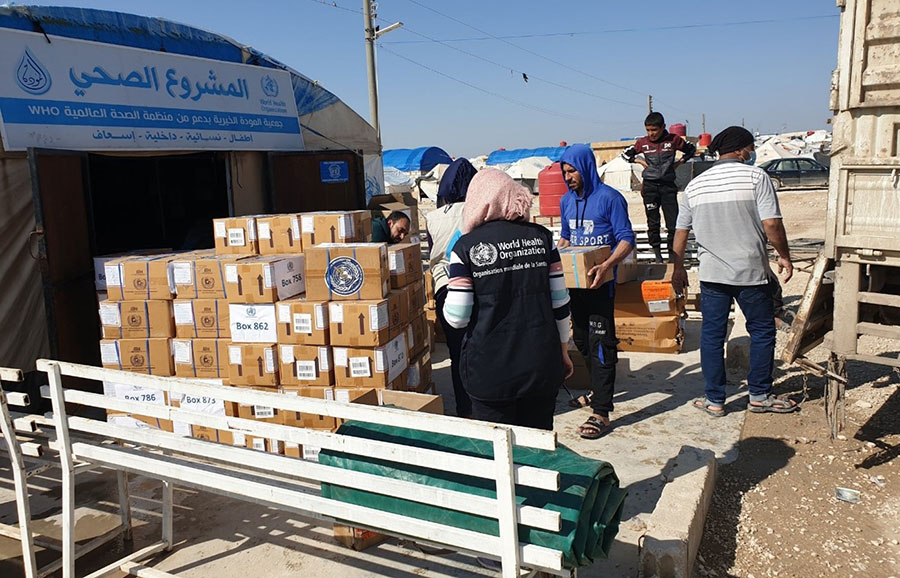 WHO marks 13 years of the Syrian crisis with renewed commitment and support14 March 2024, Damascus, Syria – As the Syrian conflict enters its 14th year, WHO reaffirms its unwavering support to the people of Syria.
WHO marks 13 years of the Syrian crisis with renewed commitment and support14 March 2024, Damascus, Syria – As the Syrian conflict enters its 14th year, WHO reaffirms its unwavering support to the people of Syria.
The prolonged crisis has inflicted immense suffering on the civilian population. A record 16.7 million people in Syria need humanitarian assistance, including 7.2 million who have been internally displaced.
Health needs are overwhelming. But the disrupted health system is struggling to provide life-sustaining and life-saving health services in a context marked by conflict, economic instability, disease outbreaks and natural disasters. Currently, 65% of Syria’s hospitals and 62% of its primary health care centres are either closed or only partially functioning.
“Thirteen years into the crisis, Syria’s health care system is at its highest need and WHO’s support is more critical than ever,” said Dr Iman Shankiti, acting WHO Representative in Syria. “Investing in essential health services is not only about saving lives today but also about preventing a complete collapse of the health system in the future.”
Since the start of the crisis in 2011, WHO has worked with the Ministry of Health and partners to help ensure that critical health care is available to those who need it most. Since the beginning of the crisis, WHO has provided almost 80 million medical treatments, supported over 11 million medical procedures and 3.3 million trauma consultations, and trained about 178 000 health professionals.
Yet, there is still more work to be done. For instance, rates of depression in Syria have doubled over the past year, as more and more people lose their homes and livelihoods and spiral into poverty.
WHO has focused on strengthening mental health services across the country. This work has included integrating mental health treatments into primary health care services and supporting almost 2 million mental health consultations. WHO has also trained tens of thousands of non-specialized health professionals on basic mental health interventions and psychological first aid.
The need for humanitarian health assistance will remain across the country for the foreseeable future. WHO will continue its life-saving operations, targeting the most vulnerable and in need, and at the same time support the country’s longer-term efforts to rehabilitate and rebuild the health system.
WHO tackles gender-based violence and victim support in post-earthquake Syria
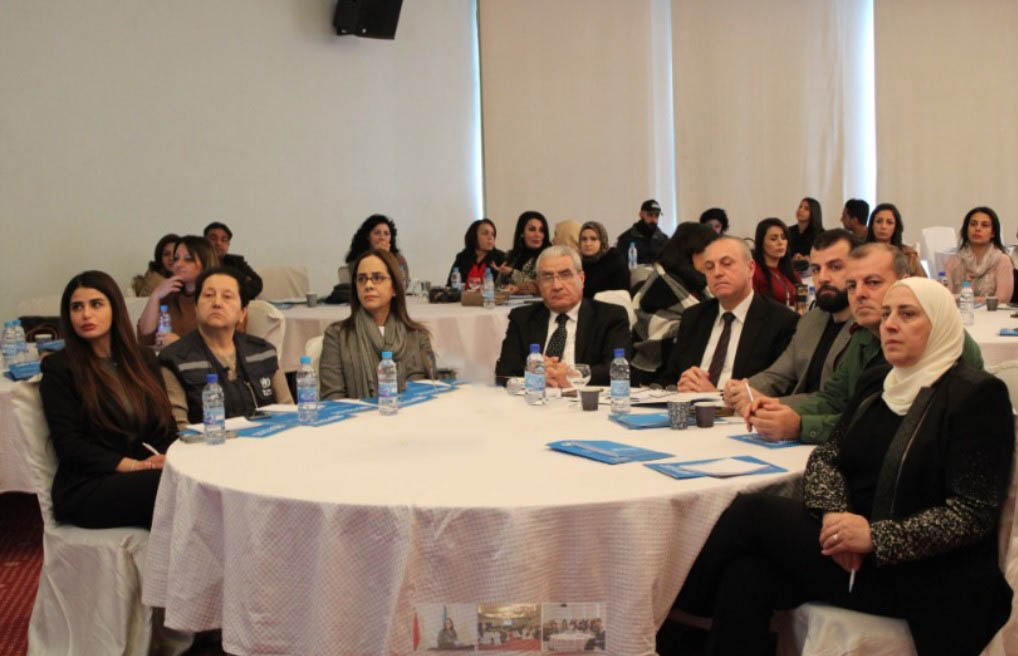 14 February 2024, Damascus, Syria – WHO has concluded the Gender-based Violence and Prevention of Sexual Exploitation and Abuse Victim’s Support in Earthquake-Affected Areas project, which it delivered with the Syrian Ministry of Health and the Syrian Commission for Family Affairs and Population. The project was launched in February 2023, following the devastating earthquake, to tackle gender-based violence (GBV) and prevention of sexual exploitation and abuse (PSEA) in the affected governorates of Aleppo, Hama and Latakia.
14 February 2024, Damascus, Syria – WHO has concluded the Gender-based Violence and Prevention of Sexual Exploitation and Abuse Victim’s Support in Earthquake-Affected Areas project, which it delivered with the Syrian Ministry of Health and the Syrian Commission for Family Affairs and Population. The project was launched in February 2023, following the devastating earthquake, to tackle gender-based violence (GBV) and prevention of sexual exploitation and abuse (PSEA) in the affected governorates of Aleppo, Hama and Latakia.
Throughout the project period, WHO collaborated with the Ministry to ensure the safety, rights, dignity and well-being of survivors of GBV and sexual exploitation and abuse. A clear referral pathway was established, ensuring prompt identification and support for over 50 reported cases of GBV and sexual harassment. Assistance was readily available in shelters and community centres, where many incidents were reported as having taken place amid crowded living conditions.
To complement these efforts, a WHO-supported team of experts, volunteers and local organization members ran more than 500 awareness sessions in the community. These aimed to educate residents about GBV and PSEA, available services and how to seek support. This two-pronged approach addressed both the immediate needs of survivors and long-term community understanding.
“Every step we take towards preventing gender-based violence is a stride towards healing, dignity, and a brighter future for all,” emphasized Dr Iman Shankiti, acting WHO Representative in Syria. “By working together, we are not only addressing a crisis, but also laying the foundation for a society that values and ensures the rights and safety of every individual.”
Thanks to the generous support of Kuwait, the project reached 100 locations across the 3 governorates, empowering numerous people with the knowledge and tools to address GBV and PSEA. WHO remains committed to fighting GBV and expanding these critical services across Syria to pave the way for a safer and more just future, where individual rights and dignity are respected and prioritized.


